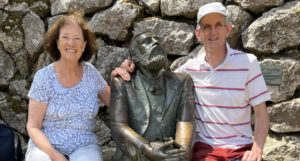Trump’s ascendency down to America’s racial divide not cult leadership, study says

The study outlines how Trump’s moral failings and lack of presidential character did nothing to undermine evangelical support for him
The power given to Donald Trump is a result of America’s racial divide rather than because he is a “cult” leader, a new study says.
Since his election opponents have accused the former president of having unique powers, but his appeal is due to white supremacist views held by some in the USA rather than because his supporters are being brainwashed, according to the research.
The study, by Susannah Crockford from the University of Exeter, is published in the journal Implicit Religion.
Dr Crockford said: “To call Donald Trump a cult leader and the Republican Party a cult is to ignore and deny the overlapping beliefs about white evangelicalism, Christian nationalism, and right-wing politics held by some in the United States.
“Trump has been portrayed as a cult leader because it is perhaps easier to accept brainwashing as an explanation than to accept the reasons for his electoral support – which come from the juxtaposition of all of these beliefs.
“To portray him as a cult leader lets his supporters off the hook, it undermines their agency and accountability. Portraying Trump as a cult is a liberal white American explanation for how the political life of the country is so different than what they had assumed it was.”
The study outlines how Trump’s moral failings and lack of presidential character did nothing to undermine evangelical support for him because the US Christian right coalition is held together by “whiteness”, and being white in the USA can still mean enhanced access to political rights, economic prosperity, and legal benefits.
Dr Crockford said: “Social changes, including the prediction of a non-white voter majority by 2048, means evangelicals have elevated Donald Trump to a messianic figure, equivalent to Cyrus the Great, a leader who will break down the current social and political order so it can be rebuilt for the benefit of believers.
“Trump’s willingness to speak only to his followers positions him as a religious leader addressing the faithful rather than a political leader who is presumed to lead the nation regardless of whether they voted for him. However, the merging of politics with religion advocated in Christian nationalism calls for this kind of leadership; one who excludes those who do not follow their values. An American leader, in the eyes of Christian nationalists, should only represent and concern themselves with “real Americans.
“Using the category of cult is problematic because it reduces accountability for those involved and it distracts from examining the historical and social systemic reasons for the success of Donald Trump and Republicanism in its current form.”



